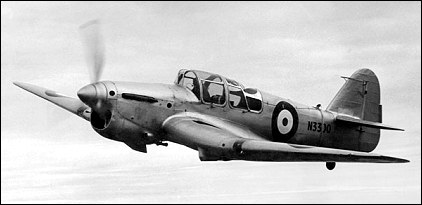|
| In January 1939 large extensions to the Miles factory were completed and opened by the Secretary of State for Air. These were necessary to cope with a large contract for the Master I high-speed advanced training monoplane: a two-seater powered by a 536kW Rolls-Royce Kestrel 30 engine. Nine hundred were built.
Soon after the outbreak of World War II, the prototype Master II flew for the first time. It was based on the Master I but powered by a 648kW Bristol Mercury XX radial engine. Production amounted to approximately 1,800 aircraft, a number of which were sent to South Africa. Master IIs were also acquired by the air forces of Egypt, Portugal and Turkey. One Master II was used in connection with rocket experiments.
The Master III was a further development of the Master series, powered by a 615kW Pratt & Whitney R-1535-SB4G Wasp Junior radial engine. A total of 602 was built. Maximum level speed was 372km/h.

| MODEL | M.19 Master Mk II |
| ENGINE | 1 x Bristol Mercury XX, 649kW |
| WEIGHTS |
| Take-off weight | 2528 kg | 5573 lb |
| Empty weight | 1947 kg | 4292 lb |
| DIMENSIONS |
| Wingspan | 11.89 m | 39 ft 0 in |
| Length | 8.99 m | 30 ft 6 in |
| Height | 2.82 m | 9 ft 3 in |
| Wing area | 21.83 m2 | 234.98 sq ft |
| PERFORMANCE |
| Max. speed | 389 km/h | 242 mph |
| Ceiling | 7650 m | 25100 ft |
| Range | 632 km | 393 miles |
| Lee Ward, e-mail, 26.08.2011 14:39 I also did my OTU training on Master I and Swordfish at Castle Coombe satellite to RAF Hullavington in early 1942. I was airborne during one of the raids on Bath when we got mixed up among some JU88s. My instructor made a rapid dive for the airfield where we arrived just as the last gooseneck flare was extinguished. The next evening we walked into Bath to view the damage and promptly got caught in another air raid on the city. We were back on the road to Castle Coombe in double quick time. reply |
| Lee Ward, e-mail, 26.08.2011 14:21 I did my intermediate and advanced training on Master IIIs at RAF Netheravon in 1941 which was a flying training school for the Fleet Air Arm. My recollection is that the one forward gun was in the port wing. reply | | Justin Sheedy, e-mail, 28.03.2011 03:16 Hi, I'm writing a book (historical fiction) featuring the Miles Master briefly: My question: Where precisely on the Master was its single forward-firing machine gun located? I've read online both that it was fitted to the wing, and also in the forward fuselage. Which was true? reply | | mhowdle, e-mail, 13.06.2010 00:29 Hi particuarlly to john eastmond, my father also flew masters from ternhill, I think he was a flt lieutenant by then, best wishes mike howdle reply | |
| | John Billingham, e-mail, 04.04.2010 18:21 Am researching this aircraft as one was known to have crashed on my families farm, in Herefordshire, UK. sometime during 1944. reply | | John Eastmond, e-mail, 15.09.2009 00:24 My father flew the Miles Master I and III at RAF Tern Hill and Findo Gask (I think). Later he flew Harvards in Scotland. He was a QFI trained in Pensicola, USA on Stearmans.
Regards
John Eastmond reply | | penni aron, e-mail, 19.06.2009 13:00 are there any milesmaster planes in museums in the u.k? reply | | R.E. Mauger, e-mail, 24.07.2008 01:05 Saw picture and 3 view drawing in 1973 Ian Allen Aircraft Illustrated Magazine .... Yes that old! Plan on building a semi-scale aerobatic, gas powered model. Great aircraft with a great history, plus a bit unusual among the model builders comunity. This makes it a perfect subject. Hate the RTF Models. reply | | daz, e-mail, 12.02.2008 01:11 Hi, ive recently came across some old photos and postcards one of which is a miles "master"advance trainer.There is some writing on the front of the postcard which reads :"DO YOU RECOGNISE ME IN THE KAPLI? THE AREOPLANE MAGAZINE PEOPLE CAUGHT ME UNAWARES"!!AND ITS SIGNED JOE REANEY OR REAMEY.THE NUMBER ON THE PLANE IS N7547 I WAS WONDERING IF YOU COULD SHED ANY LIGHT ON THIS......MANY THANX DAZ..... reply |
|
Do you have any comments?
|
| 
COMPANY
PROFILE
All the World's Rotorcraft
|









Great story, Lee! Best wishes!
reply